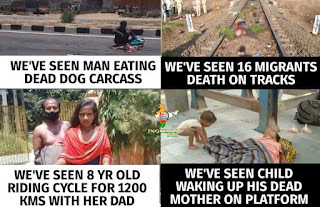COVID19 has affected almost every country in the world. In India, arguably the biggest group that the tragedy has affected are the migrant labourers and daily wagers. Forget catching the virus, the lockdown has been nearly a death knell for this group. To understand a bit more about this crisis, I would recommend reading this excellent article by Harvard University.
The first poem is “Self-sufficiency” by Badri Raina
A call has gone up:
India must learn to be self-sufficient.
It must be a tribute to our sansculottes
That they are first to learn the lesson.
Trudging on foot, they are
No longer dependent on transport,
Sparing the moneys that are
Needed for petrol and power
For urgent national causes elsewhere.
Subsisting on an occasional biscuit
And thin air, their self-sufficiency
In food leaves heaped granaries
Alone for a market that can pay,
Yielding revenues for the rainy day.
Sleeping on highways and rail tracks,
Their gesture precludes the need
For the state to waste resources
On shelter. Just as their resilience
Of body and mind helps spare
Medicines and hospital beds
For citizens whom soft living
Makes first claimants for such care.
Dying along the way, the sansculottes
Do not tax the state with burials
And cremations. They demonstrate
The truth of admonitions
Writ in holy books: once the soul
Departs, body has no meaning.
Their fall by the wayside prevents,
Moreover, danger to “social distancing”
From the prospect of unruly keening.
Altogether, India’s dour migrant
Workers hold the let
To nationalist self-sufficiency.
___
Gulzar Saab has also poignantly captured the plight of the migrant workers through his pen and voice from a human perspective. This is beyond politics!
Translated in English by Rakshanda Jalil, the poem reads like this.
The pandemic raged
The workers and labourers fled to their homes
All the machines ground to a halt in the cities
Only their hands and feet moved
Their lives they had planted back in the villages
The sowing and the harvesting was all back there
Of the jowar, wheat, corn, bajra – all of it
Those divisions with the cousins and brothers
Those fights at the canals and waterways
The strongmen, hired sometimes from their side and sometimes from this
The lawsuits dating back to grandparents and grand uncles
Engagements, marriages, fields
Drought, flood, the fear: will the skies rain or not?
They will go to die there – where there is life
Here, they have only brought their bodies and plugged them in!
They pulled out the plugs
‘Come, let’s go home’ – and they set off
They will go to die there – where there is life.
___
They say a photograph is worth a thousand words. The collage below (sourced from Twitter) is worth a million. The plight of these fellow human beings should make us hang our heads in shame! It is such a lottery where you’re born. You can’t control it and that cruelly decides how life turns out for you.
“The story of a poor man's life is written on his body, with a sharp pen.” - Aravind Adiga in The White Tiger
The first poem is “Self-sufficiency” by Badri Raina
A call has gone up:
India must learn to be self-sufficient.
It must be a tribute to our sansculottes
That they are first to learn the lesson.
Trudging on foot, they are
No longer dependent on transport,
Sparing the moneys that are
Needed for petrol and power
For urgent national causes elsewhere.
Subsisting on an occasional biscuit
And thin air, their self-sufficiency
In food leaves heaped granaries
Alone for a market that can pay,
Yielding revenues for the rainy day.
Sleeping on highways and rail tracks,
Their gesture precludes the need
For the state to waste resources
On shelter. Just as their resilience
Of body and mind helps spare
Medicines and hospital beds
For citizens whom soft living
Makes first claimants for such care.
Dying along the way, the sansculottes
Do not tax the state with burials
And cremations. They demonstrate
The truth of admonitions
Writ in holy books: once the soul
Departs, body has no meaning.
Their fall by the wayside prevents,
Moreover, danger to “social distancing”
From the prospect of unruly keening.
Altogether, India’s dour migrant
Workers hold the let
To nationalist self-sufficiency.
___
Gulzar Saab has also poignantly captured the plight of the migrant workers through his pen and voice from a human perspective. This is beyond politics!
Translated in English by Rakshanda Jalil, the poem reads like this.
The pandemic raged
The workers and labourers fled to their homes
All the machines ground to a halt in the cities
Only their hands and feet moved
Their lives they had planted back in the villages
The sowing and the harvesting was all back there
Of the jowar, wheat, corn, bajra – all of it
Those divisions with the cousins and brothers
Those fights at the canals and waterways
The strongmen, hired sometimes from their side and sometimes from this
The lawsuits dating back to grandparents and grand uncles
Engagements, marriages, fields
Drought, flood, the fear: will the skies rain or not?
They will go to die there – where there is life
Here, they have only brought their bodies and plugged them in!
They pulled out the plugs
‘Come, let’s go home’ – and they set off
They will go to die there – where there is life.
___
Why?



